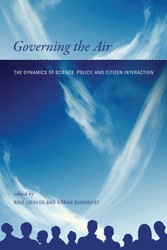Suchen und Finden
Governing the Air - The Dynamics of Science, Policy, and Citizen Interaction
Governing the Air looks at the regulation of air pollution not as a static procedure of enactment and agreement but as a dynamic process that reflects the shifting interrelationships of science, policy, and citizens. Taking transboundary air pollution in Europe as its empirical focus, the book not only assesses the particular regulation strategies that have evolved to govern European air, but also offers theoretical insights into dynamics of social order, political negotiation, and scientific practices. These dynamics are of pivotal concern today, in light of emerging international governance problems related to climate change. The contributors, all prominent social scientists specializing in international environmental governance, review earlier findings, analyze the current situation, and discuss future directions for both empirical and theoretical work.The chapters discuss the institutional dimensions of international efforts to combat air pollution, examining the effectiveness of CLRTAP (Convention for Long-Range Transboundary Air Pollution) and the political complexity of the European Union, offer a broad overview and detailed case studies of the roles of science, expertise, and learning, and examine the 'missing link' in air pollution policies: citizen involvement. Changing political conditions, evolving scientific knowledge, and the need for citizen engagement offer significant challenges for air pollution policy making. By focusing on process rather than product, learning rather than knowledge, and strategies rather than interests, this book gives a nuanced view of how air pollution is made governable.
Alle Preise verstehen sich inklusive der gesetzlichen MwSt.









